Senior Israeli officials expressed optimism on Monday morning over the prospects that the fresh ceasefire with Palestinian Islamic Jihad would hold up, but stressed that Jerusalem did not agree to demands that it release members of the terror group it recently arrested.
“We can now start looking toward the next phase,” said one of the officials who briefed Israeli reporters.
The Egyptian-mediated deal, which went into effect at 11:30 p.m. Sunday, ended a three-day conflict that began Friday with Israeli strikes that killed a top PIJ commander. Palestinian terrorists subsequently fired around 1,100 rockets toward Israeli territory, while the Israel Defense Forces hit Islamic Jihad targets and killed another of the Iran-backed organization’s top military leaders in Gaza.
There were also signs that Operation Breaking Dawn, and the manner in which it came to a rapid end, would lead to additional progress on talks with Hamas and PIJ in Gaza, said the officials.
“We are absolutely aware that there is an opportunity in the aftermath that we don’t want to miss,” said one of the officials, highlighting the ongoing attempts to arrange for the return of Israeli civilian captives and bodies of IDF soldiers held by Hamas, among other imperatives.
Get The Times of Israel's Daily Edition by email and never miss our top stories
“The signals from Hamas in recent weeks have been received,” the official continued. “We want to take things forward, and not make do only with a ceasefire with PIJ.”
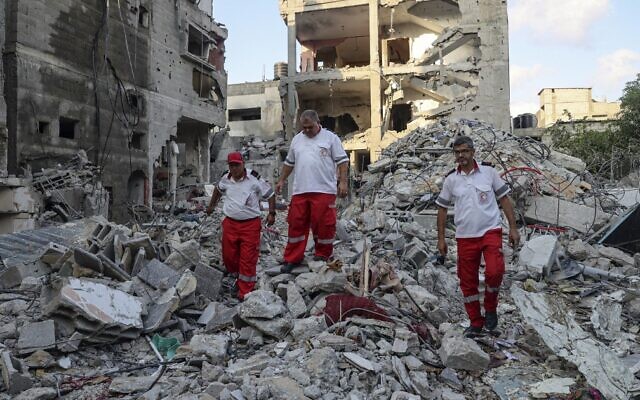
Rescuers walk in the rubble of a building following Israeli airstrikes in Rafah in the southern Gaza Strip, on August 7, 2022, amid fighting between the Israel Defense Forces and Palestinian Islamic Jihad terror group. (Said Khatib/AFP)
The Hamas terror group holds two living Israelis — Avera Mengistu and Hisham al-Sayed — as well as the bodies of two Israeli soldiers: Oron Shaul and Hadar Goldin.
Israel and Hamas have held indirect talks in an attempt to reach a prisoner exchange deal. A similar deal in 2011 to release Israeli soldier Gilad Shalit from Hamas’s clutches saw 1,027 Palestinian security prisoners released, many of them convicted terrorists.
However, Israel is not about to release the PIJ prisoners that the organization wants to see freed.
During the ceasefire talks, Israel did not agree to release Khalil al-Awawda, a Palestinian Islamic Jihad member who is hunger-striking in protest of his detention by Israel without any charges, and the terror group’s West Bank leader Bassam al-Saadi, who was arrested last week in a move believed to have sparked the round of violence in Gaza, the officials said.

The West Bank head of the Palestinian Islamic Jihad terror group, Bassem Saadi, is seen shortly after his arrest by Israeli troops on August 2, 2022. (Courtesy)
Israel has no intentions to release the prisoners early, The Times of Israel has learned.
Diplomatic payoff
The officials also expressed satisfaction with Israel’s diplomatic efforts leading up to the operation and during it, pointing to Egypt, Qatar, and the United States as key players.
“They knew all the elements of our decision-making beforehand, and also our efforts to avoid acting and to ensure [the operation] was as limited as possible,” said one of the officials.
Jerusalem initially expected PIJ to fold under pressure from the aforementioned countries — and from Hamas — to abandon plans to attack Israel, obviating the need for an operation, said the officials.
As tensions rose, Israel restricted movement near the Gaza border to reduce friction and make it harder for PIJ to carry out a sniper or anti-tank attack, but understood it couldn’t keep its border towns in those conditions for long.
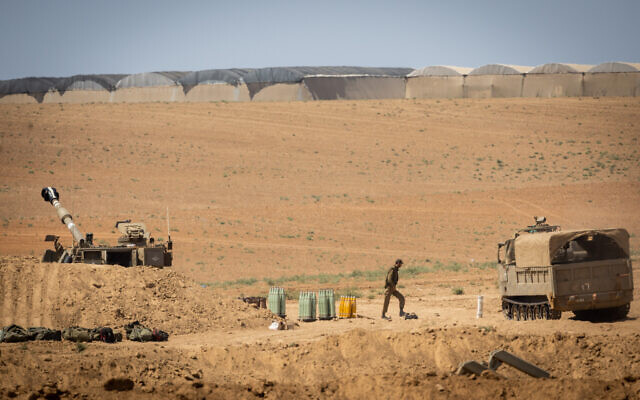
IDF units operate near the border with Gaza on August 7, 2022 (Yonatan Sindel/Flash90)
Once Israel determined an escalation was unavoidable, the aim was to strike PIJ cells and senior leaders planning attacks, while avoiding hitting Hamas targets.
Israel also sought to achieve a rapid de-escalation, determining that an extended operation risked inadvertently causing damage that would push Hamas into the fight.
Ceasefire efforts began on Saturday, the second day of the operation. “We understood that PIJ was not achieving what it wanted. The strikes against it were significant,” said an official.
The fact that Palestinian Islamic Jihad’s general-secretary Ziad Nakhaleh was in Tehran meeting the commander of the Islamic Revolutionary Guard Corps made it harder to him to agree to a ceasefire, according to the officials.
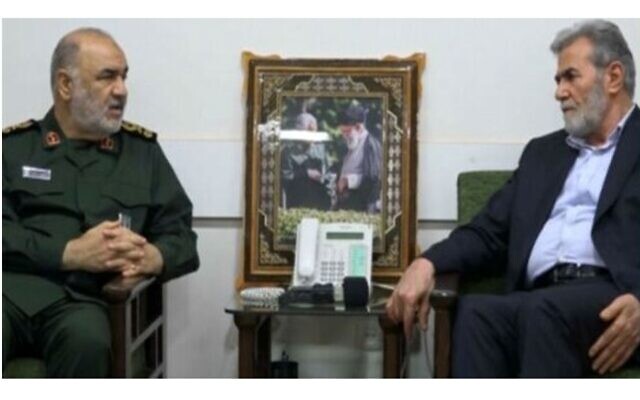
Head of Iran’s Islamic Revolutionary Guard Corps (L) meets in Tehran with Palestinian Islamic Jihad’s general-secretary Ziad Nakhaleh, August 6, 2022
There were discussions about a temporary humanitarian ceasefire on Saturday night, but Prime Minister Yair Lapid rejected that offer, insisting on a full halt to hostilities.
Israel’s political leadership initially wanted the ceasefire to come into effect Sunday afternoon, the officials revealed, but had to wait a few more hours to allow the IDF to complete operations.
Officials were especially pleased with Egypt’s role. “The Egyptian mediation was very intensive; our relationship with them is extremely close.”
The official also praised the role Qatar played, calling the Gulf country “a player that creates economic stability.”
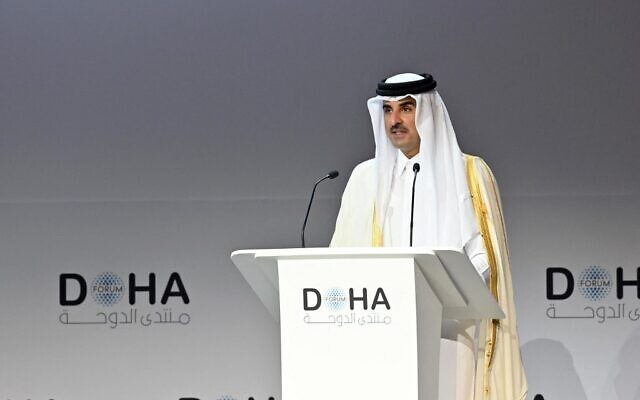
Qatar’s Emir Sheikh Tamim bin Hamad al Thani addresses the opening session of the Doha Forum in Doha on March 26, 2022. (AMMAR ABD RABBO / MOFA / DOHA FORUM)
Israel does not have diplomatic relations with Qatar, though the two countries maintained trade and low-level diplomatic ties in 1996-2009. Since then, there has been some ongoing contact, especially on matters relating to the Gaza Strip.
The officials also said that Lapid understood the sensitivities around embarking on a military campaign ahead of an election, and sought to fully explain his rationale to ministers and to the public.
Israel is set for its fifth elections since 2019 on November 1.
Hamas on the sidelines
Hamas, which rules the Gaza Strip and has fought Israel in four major operations since Israel left the coastal territory in 2005, pressured PIJ to consent to the ceasefire, according to the officials, warning that “[PIJ] is endangering the population.”
“We knew throughout that Hamas wanted to stay out” of the conflict, said the officials.
However, they said, Hamas failed in its responsibility to work to head off a conflict by pressuring PIJ before it started.
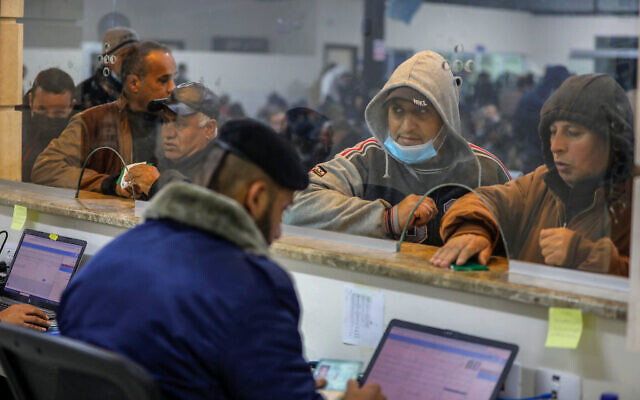
Palestinian workers wait at the Erez crossing in Beit Hanoun, in the northern Gaza Strip, as they wait to enter Israel for work, on March 13, 2022. (Attia Muhammed/Flash90)
“That is an expectation we have of someone who presumes to rule the Strip and its population,” said one of the briefers.
Hamas stayed out of the fight because of Israel’s military and civil policies over the past year, argued the officials. “That includes Operation Guardian of the Walls, and the important economic incentives for the population.”
The potential for economic harm to Gazan families from having thousands of workers barred from entering Israel had the effect on Hamas that Israel wanted, they said. In June, Israel increased the number of work permits for Palestinians in the Gaza Strip to 14,000, a 100% increase from the previous summer.
The return to Israel’s regular policies toward Gaza will happen gradually, and will happen in a way that “sends a message about the future,” said one of the officials.
These policies are expected to be put back in place over the next couple of days.
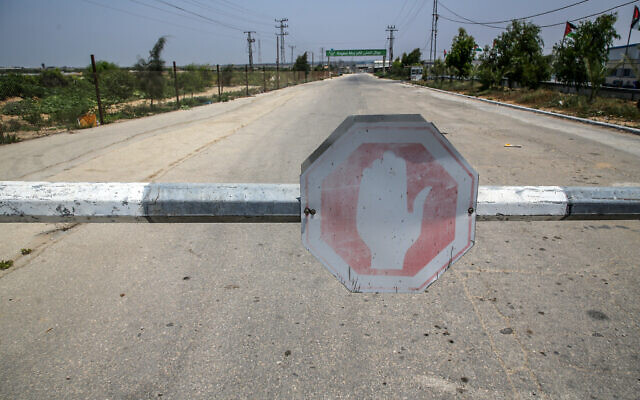
View of the closed Erez crossing, in Beit Hanun, between Israel and the northern Gaza Strip, on August 4, 2022. (Attia Muhammed/Flash90)
On Monday, the military liaison to the Palestinians announced that crossings between Israel and Gaza would reopen for humanitarian purposes after a security assessment.
The reopening allowed renewed fuel shipments into Gaza, after the closures led the Strip’s sole power plant to drastically reduce operations.
The Defense Ministry body, widely known by its acronym COGAT, said a meeting to consider a full reopening of the crossings will be held if calm is maintained in the south.
The Erez terminal between Israel and Gaza, which serves as the sole pedestrian crossing for Palestinians in the coastal enclave, was struck Sunday by mortars launched from Gaza, according to the Defense Ministry.
Emmanuel Fabian contributed to this report.


